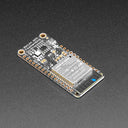Adafruit AirLift FeatherWing – ESP32 WiFi Co-Processor
by Adafruit





Give your Feather project a lift with the Adafruit AirLift FeatherWing - a FeatherWing that lets you use the powerful ESP32 as a WiFi co-processor.
You probably have your favorite Feather (like the Feather M4) that comes with its own set of awesome peripherals and lots of libraries. But it doesn't have WiFi built in! So lets give that chip a best friend, the ESP32. This chip can handle all the heavy lifting of connecting to a WiFi network and transferring data from a site, even if its using the latest TLS/SSL encryption (it has root certificates pre-burned in).
Having WiFi managed by a separate chip means your code is simpler, you don't have to cache socket data, or compile in & debug an SSL library. Send basic but powerful socket-based commands over 8MHz SPI for high speed data transfer. You can use 3V or 5V Arduino, any chip from the ATmega328 or up, although the '328 will not be able to do very complex tasks or buffer a lot of data. It also works great with CircuitPython, a SAMD51/Cortex M4 minimum required since we need a bunch of RAM. All you need is an SPI bus and 2 control pins plus a power supply that can provide up to 250mA during WiFi usage.
Adafruit placed an ESP32 module on a FeatherWing with a separate 3.3V regulator, and a tri-state chip for MISO so you can share the SPI bus with other 'Wings. Comes fully assembled and tested, pre-programmed with ESP32 SPI WiFi co-processor firmware that you can use in CircuitPython to use this into WiFi co-processsor over SPI + 2 pins. They also toss in some headers so you can solder it in and plug into a doubler, but you can also pick up a set of stacking headers to stack above/below your Feather.
Adafruit have tested this with all their Feathers and it should work just fine with them except the ESP8266 & ESP32 Feathers (cause they already have WiFi!). For use in Arduino, the '328 and '32u4 you can do basic connectivity and data transfer but they do not have a lot of RAM so we don't recommend them - use the M0, M4 or similar, for best results! For CircuitPython use, a Feather M4 or nRF52840 works best - the M0 series does not have enough RAM in CircuitPython.
The firmware on board is a slight variant of the Arduino WiFiNINA core, which works great! At this time connection to Enterprise WiFi is not yet supported.
TECHNICAL DETAILS
- Product Dimensions: 50.0mm x 23.0mm x 5.0mm / 2.0" x 0.9" x 0.2"
- Product Weight: 0.1g / 0.0oz
LEARN
-
Primary Guide: Adafruit AirLift FeatherWing - ESP32 WiFi Co-Processor - Add a FeatherWing AirLift to give your projects an internet-enabled lift!
-
Welcome to Adafruit IO - Want to connect your project to the Internet? Start Here!
We no longer stock this product
It's sad to say goodbye but sometimes we have to retire products to make way for new things.
You may still be able to buy this product directly from our friends at Adafruit - check out their website!
Shop with confidence – we've been serving the hobbyist electronics, Maker, and retro gaming communities since 2012.
- Satisfaction or refund guarantee
- Worldwide shipping via mail or courier
- 57,000+ customer reviews
- Secure website and payments